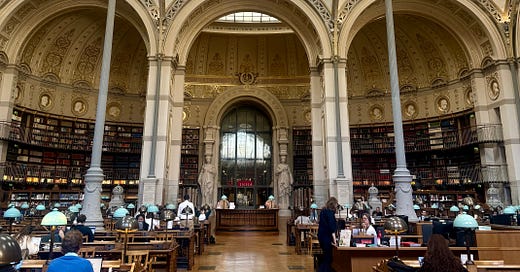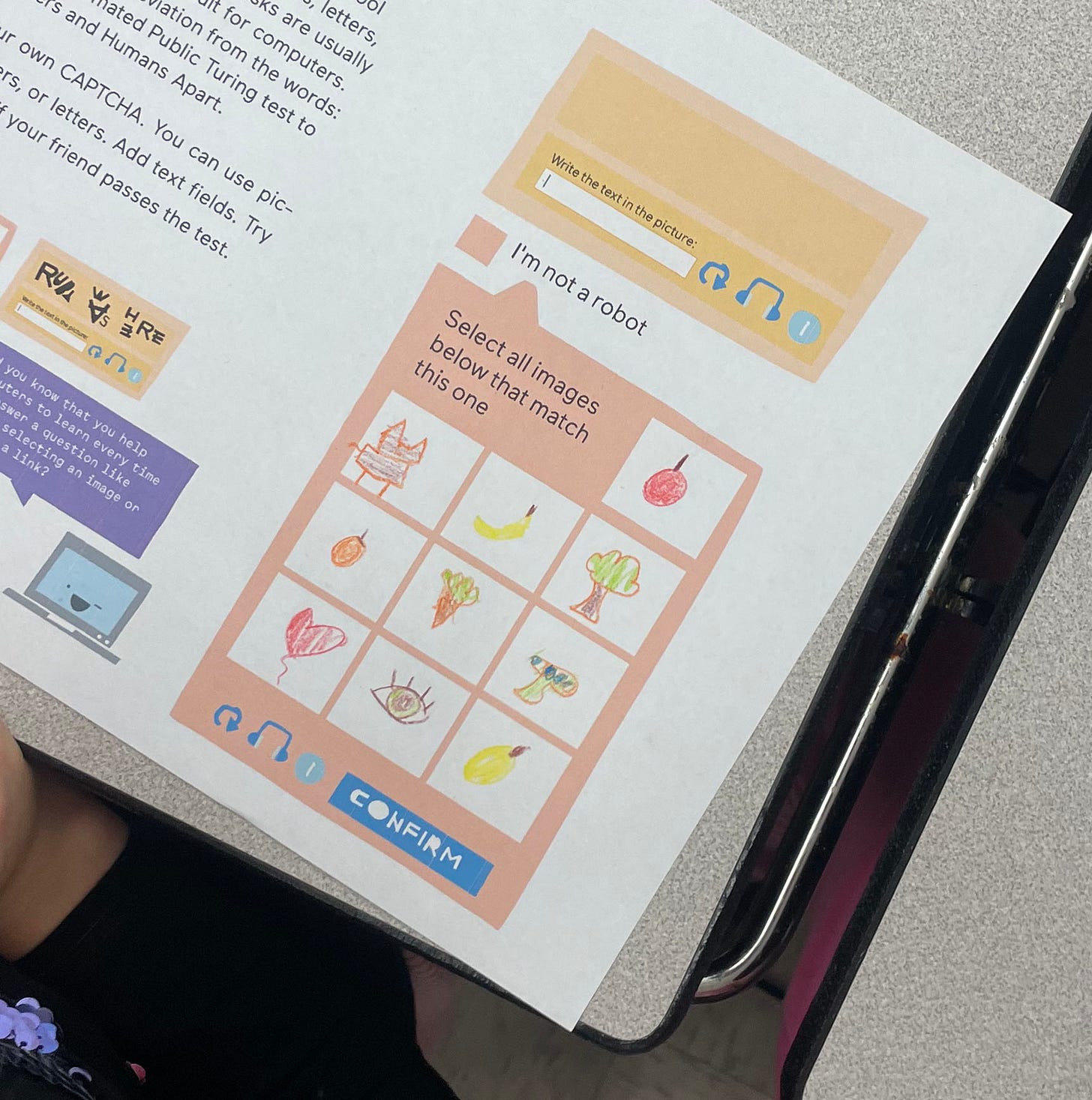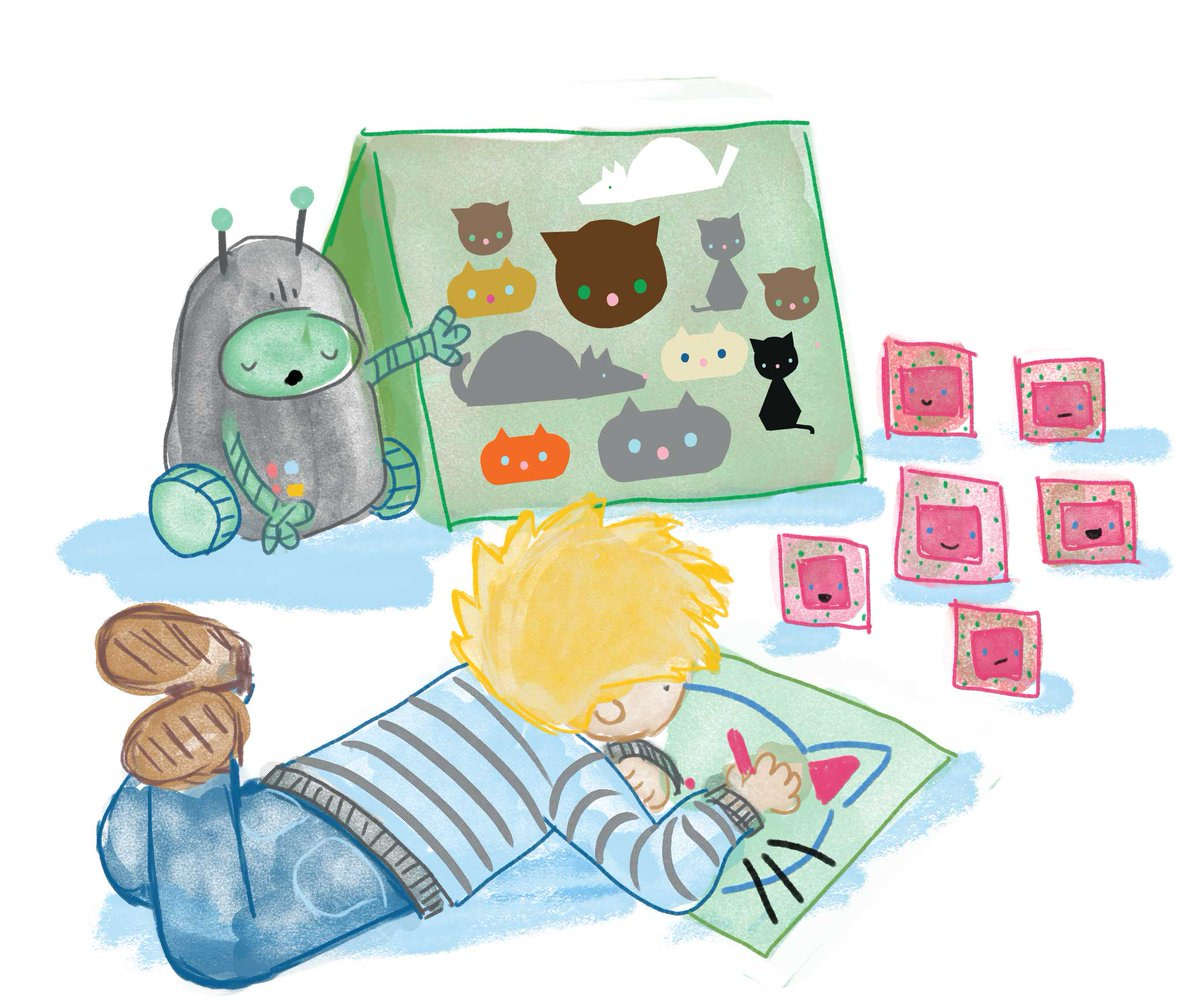My name is Linda. I write a bi-weekly newsletter about computer science, childhood, and culture.
It took me almost five years to get to one hundred editions. A few pauses for child-rearing, some for family life, and a few for having nothing to say. And maybe most importantly, this newsletter has helped me point at something and say, this is what I find interesting. (And I still haven’t found a way to answer my twelve questions).
There are three big projects I’ve brought to some kind of finish line this spring: the playground, the non-fiction book, and crossing the 100-mark with this newsletter. All of them began in 2020. This week, for the first time in a long while, I’ve been staring out the window at my desk with no burning next thing.
I called E. and said, "I might be having a midlife crisis." She said, "Give it a few days."
So that’s what I’m planning to do.
To celebrate reaching one hundred, here’s a collection from the archive. I’ve been digging through old entries, sorting and grouping the posts. I’m really glad all of this exists. It’s not just a record of what I’ve been thinking about over the years, but how.
Practical Guides for Educators
Tiny experiments and practical activities for classrooms.
24 creative coding ideas for December (Nov 30, 2020)
60-Second computer science video set. Quick explainer videos to introduce key computing concepts in under a minute. (Sep 08, 2020)
Math meets computing: printable activities & hands-on worksheets. Includes sorting, logic, and visual puzzles to bridge math and code (Nov 05, 2020)
AI & CAPTCHAs: a mini lesson plan with activity sheet (Jan 16, 2024)
Hopscotch coding: a movement-based flowchart activity. Learn sequencing and control flow with chalk, rhythm, and fun (Feb 20, 2024)
Design your own computing playground. A curriculum guide inspired by a real-world educational playground (Apr 23, 2024)
Build a hardware printing press with LEGO DOTS. Hands-on activity for understanding computer parts (Apr 2, 2023)
What shape is the internet? An arts-integrated lesson plan on the internet (Jun 16, 2022)
Playgrounds and urban space
These posts became a diary of planning, designing, and constructing a playground inspired by computers.
On the case of creating a playground for computers(Aug 25, 2021)
Running research with children (Mar 15, 2022)
Early sketches and ideas for the abacus (Dec 10, 2023)
Time to construct! (May 20, 2024)
Looking at a construction site (Jun 15, 2024)
Modular play designs for future parks (Jul 10, 2024)
Play in the streets (Sep 25, 2024)
A playground is born (Oct 09, 2024)
The story of making the playground from the inside (Oct 29, 2024)
A talk I gave on the ideas around the playground (Nov 26, 2024)
Hopscotch activity (15 Jan 2025)
The playground curriculum (22 Apr 2025)
How does it feel to be a computer?
These posts look at artificial intelligence from unusual angles. They ask, "Why don’t we have better words and images for the kinds of intelligence we’re building?"
A look at how we visualise AI (Jul 26, 2022)
Umwelt and how does it feel like to be a computer (Sep 01, 2022)
On prompt engineering, the novel word I had just heard and how art pedagogists might be of help (Nov 23, 2022)
A Matrix of AIs - why do we have so few collective nouns for technology? (Mar 19, 2024)
First Artificial Intelligence Coloring Book - from 1984 (Jul 25, 2023)
ChatGPT Is Like a Calculator for Words (Jan 31, 2023)
What about very small datasets? (Mar 11, 2025)
What can parenting teach us about AI? (Mar 05, 2024)
Taste, algorithms and AI (Jun 03, 2024)
How childhood animism can help reframe computing (Oct 07, 2020)
Books and reading
An ode to endpapers, footnotes, translations, and reading as a tactile, resistant act.
What handwritten notes, palimpsests, and Fred Rogers can teach us about paying attention (Apr 26, 2021)
A visual and thematic pairing of books with unexpected pairs (Jun 27, 2023)
How to Build Your Own Summer Reading Algorithm (Jul 13, 2022) and Books of 2024 with thematic groupings (Dec 23, 2024)
Book reviews: Surprised by Joy (Nov 03, 2023), Darkome (Nov 13, 2024) The Empathy Diaries (Mar 23, 2021), There are places in the world where rules are less important than kindness (Sep 15, 2021)
On the beauty and frustration of translating children’s books (May 09, 2023)
On editing (Feb 20, 2024)
Pedagogy of computing
What makes something worth teaching? And what makes it stay? These posts explore computing pedagogy beyond grading rubrics and standardized drills.
Why we teach history with dates and computers with pancakes (May 17, 2021)
What early childhood education, Reggio Emilia, and the logic of small hands can teach (Aug 11, 2020)
How playful projects and care can reframe a technology summer camp (Jun 06, 2023)
The most pedagogically radical TV show ever made (Aug 17, 2024)
Writing for ears. What I learned on rhythm, attention, and the art of designing audiobooks. (May 30, 2022)
Recently Returned: The Language of Algorithms (Feb 11, 2025)
Multiplayer mode (Mar 29, 2023)
Drawing as a way of thinking
I was surprised to find so many posts that had to do with drawing. Drawing not as decoration, but as an investigative gesture.
What’s Inside a Computer? Draw It to Find Out (Nov 17, 2020)
To See Like David Hockney (Nov 12, 2021)
They All Saw a Cat (Jan 23, 2024) which later led to They All Saw a Computer (Apr 16, 2024)
Thinking with hands
A collection of posts that explore learning that begins in the fingertips: sorting pancakes, weaving computers, choreographing robots, and folding paper.
Handwork (Jan 14, 2021)
What Anni Albers can teach us about memory (Sep 28, 2021)
How a circuit board is a meeting point between humans and electricity (Jul 11, 2023)
The three handshakes of TCP/IP (Jun 15, 2021)
All Art Starts With a Touch (even space telescopes) (Oct 04, 2023)
Inside the pandemic pause
Dispatches from the middle of a strange time. Reflections on teaching, entertainment, and social closeness during an era that now feels almost science fiction scifi now.
No bullet points—this is how I crafted online lessons with emotion (Feb 11, 2021)
Isoprenes and other musings on the air we breathe (Oct 25, 2021)
Visiting Helsinki during a pandemic (Apr 09, 2021)
Computing as culture
This is a collection of posts that are more philosophical in nature. All of them wonder: what happens when we treat computing like culture, and culture like infrastructure? I feel like many of these are stepping stones to new projects.
What if every science syllabus came with a short story? (Aug 22, 2023)
On planetary fiction (Nov 02, 2022) and later On scale (Apr 25, 2023)
What are the shapes of our stories around technology? (Aug 17, 2021)
What old computing museums can teach us (May 23, 2023)
How Freeman Dyson inspired me to play with citrus fruit (Feb 06, 2024)
Why I stopped teaching computer history like a timeline (Feb 23, 2021)
Tech trees, seed vaults, and other cold archives (Mar 10, 2021)
Tiny Portals & Revolving Bookshelves (Aug 30, 2021)
How art history can influence computing education (Aug 27, 2024)
Discovering Klara von Neumann (Jan 18, 2022)
Archaeological algorithms (Jan 31, 2022)
Polish timetables (Oct 18, 2023)
Years in Review
I hate writing these, but love having them. A mix of year-end inventories and AMAs over the years.















I just listened to your 2015 episode on the CodeNewbie podcast! I really liked your ideas about drawing, being exposed to computers, and learning about the layers of abstraction in computers.
Now, I'm gonna read all your stuff 😁.